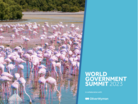Report: Middle East firms must do more to protect nature

Climate change may well be the existential crisis of our times, but is your company doing enough to protect nature?
This may at first sound like an obvious ‘yes’ but there is a distinction to be drawn between climate change and nature loss, even though they are inextricably linked.
Nature loss intensifies climate change risks, and climate change accelerates nature loss. For example, deforestation releases CO2 into the atmosphere and reduces carbon capture. This leads to global warming, which increases droughts and wildfires, further adding to deforestation. And so the sorry circle goes.
A new report from consultancy Oliver Wyman and the World Government Summit suggests private sector companies are not doing their bit when it comes to natural capital, and they should follow the example being set by governments.
Nurturing Natural Capital: The Middle East Imperative focuses on enhanced reporting by including information about the ways in which private sector companies and financial institutions impact natural capital.
The Taskforce on Nature-related Financial Disclosures (TNFD) framework could help companies assess, report, and act upon nature-related risks and opportunities, according to the report, which suggests almost half of the region's GDP depends on the environment.
‘Lot to lose for Middle East’ regarding nature risk
Mohamed Yousef Al Sharhan, Deputy Managing Director of the World Government Summit, stressed the importance of partnerships and cooperation between governments and the private sector. He said quick solutions were needed to meet sustainable development goals and halt climate change.
“There is a lot for the Middle East to lose if it does not address nature-related risk urgently – and a lot for it to gain if it does, increasing sustainable financing opportunities, and thus attracting the capital required for the pipeline of ambitious transformation projects across the region," said Johnny Ayoub, Partner at Oliver Wyman, and the firm’s regional lead on climate and sustainability.
“The private sector in the Middle East, if guided by the principles put forward by the TNFD framework, can – and surely will – become a formidable force in the fight for nature.”
The report highlights a number of examples where leaders of Middle East countries have made positive steps towards protecting natural and environmental capital.
These include the UAE's efforts to protect and restore its mangroves – doubling the number of mangroves in the past 30 years when more than a fifth of mangroves were lost in the rest of the world. In Saudi Arabia, great work is being done to protect and restore coral reefs.
However, the contribution from the private sector has been minimal, according to the report.
That said, there is a new eco-tourism project mooted for Dubai which would see the creation of 200 square kilometres of coral reef, and Abu Dhabi has also become the first city in the region to join the City Biodiversity Index.
The TNFD was established in 2021 to develop a risk management and disclosure framework, built on the so-called LEAP process:
- Locate their interfaces with nature
- Evaluate their dependencies and impacts
- Assess their risks and opportunities
- Prepare to address nature-related risks and opportunities
The World Government Summit is a global knowledge exchange platform that convenes leaders from governments and the private sector to achieve long-term sustainability.
READ the full report here.



